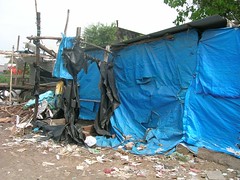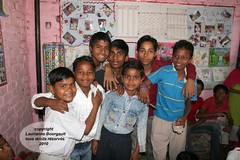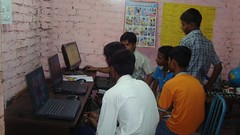
by Anuradha Bakshi | May 30, 2010 | Uncategorized
 Charity needs to be sustainable was the headline of a recent article in a leading magazine. Needless to say it caught my eye and I hastened to read it. It was an interview with a top honcho, a lady at that, who shared her view about CSR about charity. For her charity was a redundant term because it is a ‘one-time’ gesture and unsustainable. More power to you lady! I read on and could not but smile as once again it seemed our tale of forgotten biscuits was being revisited.
Charity needs to be sustainable was the headline of a recent article in a leading magazine. Needless to say it caught my eye and I hastened to read it. It was an interview with a top honcho, a lady at that, who shared her view about CSR about charity. For her charity was a redundant term because it is a ‘one-time’ gesture and unsustainable. More power to you lady! I read on and could not but smile as once again it seemed our tale of forgotten biscuits was being revisited.
Ms Bali wants to make her biscuits healthier by fortifying them so as to fight rampant malnutrition ‘covertly’. Hence everyone who consumes the biscuits made by her company, and they are consumed by a large cross section of society, would be ‘healthier’! As she says: Our products are available throughout India. And, by fortifying them, if we are making them accessible to a large mass of people, we are not solving India’s malnutrition problem, but we are contributing to alleviating it. That is what she means by social corporate sustainability a new mantra I presume. Good wishes to her. I will not debate the issue here as this is not the aim of this blog. CSR has always been my ‘bete noire’ and I am yet to comprehend its true motives. I do wonder how enriching biscuits that are then sold amounts to CSR. But I agree with Ms Bali on the fact that charity has to be sustainable and not a one time gesture.
When we sought help to launch and sustain our nutritive biscuits programme, targeted mainly at the beggar children of our city, we were hoping to address the child beggar issue by making the business of begging non-sustainable. If one gave a biscuit instead of the expected coin maybe the handlers and mafia would look for other more lucrative ways. In the bargain you also gave nutrition; a real win-win situation. But sadly it did not work out for reasons I am yet to fathom.
The same happened with our rupee a day programme where we hoped to tap in the one perennial resource of our land: the numbers of people. What we asked was something that each and everyone could part with as one rupee got you nothing, not even a cup of tea. The idea was to make everyone a donor and make everyone participate in bettering the morrows of others. And it seemed so doable as all we were looking for at that time was 4000 such donors. In a land of a billion it seemed simple. But again we failed. And again I do not know why. It seemed so logical.
This has been my battle for 10 long years, a battle I am still nowhere near winning. Right from the outset, when I was handed over my first donation, I knew that this was just a temporary phase and that we would have to look at long term sustainability. The idea of depending on others is neither acceptable nor feasible. Planet Why still seems very elusive as we wait for the expert validation. And where it to go our way, the whole project is daunting in more ways than one. The other side of the spectrum is the tried and tested corpus fund, something I have always abhorred. But has not pwhy been a personal journey of getting over my own bete noires. What is at stake is too precious: the morrows of children and their dreams. So help me God!

by Anuradha Bakshi | May 26, 2010 | Uncategorized
 When Ruchika’s tormentor was handed over a laughable sentence some months back, the nation was outraged. Television channels were replete with debates on the issue and everyone wondered how the matter would end. It had taken many years to nail the elusive perpetrator and all one got was a suspended sentence and a paltry fine that any one could pay. I too had vented my anger and sadness in a blog entitled will I be safe tomorrow!
When Ruchika’s tormentor was handed over a laughable sentence some months back, the nation was outraged. Television channels were replete with debates on the issue and everyone wondered how the matter would end. It had taken many years to nail the elusive perpetrator and all one got was a suspended sentence and a paltry fine that any one could pay. I too had vented my anger and sadness in a blog entitled will I be safe tomorrow!
Today, six months later, the high profile molester is behind bars. he has been there for a week and will spent at least three more weeks there. The law has caught up with him in spite of all his contacts, his connections and the power he once yielded. That it took over two decades is another matter. It took a public campaign to get him nailed. When young Ruchika was molested there was no 24 hour TV, no activism, no public outcry. The family could just knock at various doors that failed to open. And battle lines were drawn with one side playing dirty. The family was humiliated and scorned. The young girl took her life. Justice remained blind. Even today the accused is behind bars not for having caused the child’s death, but for having molested her. Whether he will pay for the bigger crime remains to be seen.
There are millions of Ruchika who suffer in silence every day. They often lock themselves and loose the key. They know that they will not be heard, believed , let alone protected and vindicated. They are far too aware of the reality that surrounds them. They know the might of the adversary and what is often worse is that they often have to continue sharing the same space as most of such cases are perpetrated within the so called safety of one’s home. They just suffer in silence and try to perfect the art of becoming invisible, living in fear day after day. How does one protect such children? How does one protect the little girl abused by a kin? Who will ring the bell for her?
I hope that Ruchika’s case will help us open our eyes. I hope parents and caretakers will begin to look with their heart and see the reality as it is. That they will reach out to the child who sometimes slowly and almost imperceptibly begins to ‘change’. That they will find the time to listen and believe and not be swayed social or other pressures. Till that day does not come little girls will never be safe from lurking predators who prowl secure in the knowledge that no one will dare challenge their power.

by Anuradha Bakshi | May 25, 2010 | okhla, women centre
 I recently came across an article about a ‘school’ in a garbage dump in Mumbai. The article is uncanny. It could have been written for us. It almost recounted the story of our Okhla centre, a story I had never written. It was time to make amends.
I recently came across an article about a ‘school’ in a garbage dump in Mumbai. The article is uncanny. It could have been written for us. It almost recounted the story of our Okhla centre, a story I had never written. It was time to make amends.
My mind travelled back to the summer of 2004 when one of our teachers came and told us about the plight of a bunch of kids that lived in the slums near her home. Most of them, particularly boys, were not in school and spent their time loitering and were used by predators to steal and push drugs. The are in question was close to a railway track and the little boys were trained to steal from stopped trains anything they could lay their hands off. Moreover the area was home to some notorious drug dealers and little children were easy prey. A few coins or the promise of a treat were enough to get the boys to comply. I was deeply disturbed by this and asked her whether we could begin an outreach centre. Unaware of the lay of the ground, I asked her to find us a room to rent! She smiled and told me that barring factories and slums there was nothing else. I refused to accept easy defeat and requested her to look for something.
A few days later, she came back and said that there was a garbage dump that we could use. These were still early days of project why and I must admit teaching in a garbage dump was almost anathema but then children stealing and peddling drugs was a greater abomination. So I asked her to explore the possibilities. A few more days went by and she came back tome saying that she had talked to the local politicos and cops and got a tacit nod from them with a proviso: that we would move lock, stock and barrel the day the space would be needed. I must add here that the dump we are talking about is ‘owned’ by the government. Beggars cannot be choosers and in this case the need was too great. It was time I visited the place.
 Nothing could have prepared me for what I saw, more so because I was supposedly looking at it with a view to set up a children’s centre. The place was filthy with layers and layers of garbage and along side there were a handful of ramshackle huts that housed mostly physically handicapped persons, who were all known to be drug peddlers. They looked scary to say the least. But the space that lay in front of my eyes was huge by our standards and had ‘potential’. There was no way we could clean the place. How do you clean years of filth. So the next best option was to dump earth on it. We had to get several truckloads. And then keeping in mind the caveat we had been served and had agreed to, we set up a flimsy structure made of bamboo and plastic sheets. And on a warm summer morning classes began. It was June 2004 exactly six years ago!
Nothing could have prepared me for what I saw, more so because I was supposedly looking at it with a view to set up a children’s centre. The place was filthy with layers and layers of garbage and along side there were a handful of ramshackle huts that housed mostly physically handicapped persons, who were all known to be drug peddlers. They looked scary to say the least. But the space that lay in front of my eyes was huge by our standards and had ‘potential’. There was no way we could clean the place. How do you clean years of filth. So the next best option was to dump earth on it. We had to get several truckloads. And then keeping in mind the caveat we had been served and had agreed to, we set up a flimsy structure made of bamboo and plastic sheets. And on a warm summer morning classes began. It was June 2004 exactly six years ago!
 The Okhla story has been one of ups and downs, of elation and frustration. A true pwhy story. It was launched by two very special women, who weathered every storm that came their way. It is a story of strange encounters. It is a story of a bunch of children and their teachers defying every odd be the heat, or the unexpected storms. It is a story of grit, determination and above all triumph. Today Okhla has a secondary class and even a computer centre.
The Okhla story has been one of ups and downs, of elation and frustration. A true pwhy story. It was launched by two very special women, who weathered every storm that came their way. It is a story of strange encounters. It is a story of a bunch of children and their teachers defying every odd be the heat, or the unexpected storms. It is a story of grit, determination and above all triumph. Today Okhla has a secondary class and even a computer centre.
Above all it is the story of a magical garbage dump that metamorphosed into a vibrant space that conjures dreams and desires and makes them come true
by Anuradha Bakshi | May 21, 2010 | manu
The last donation! Sounds ominous but is is not, quite the contrary it is the harbinger of hope, and freedom.
For the past ten years we have been trying to make a difference in the lives of the less privileged and can say with pride that we have succeeded in more ways than one. We launched project why, with the aim of answering all the disturbing ‘why’s that came our way. With limited resources and an abundance of passion and fervor we have helped hundreds of children stay in school and complete their education, have brought smiles on the faces of a bunch of incredible special children and given them reason to live, have rescued a handful of kids who would have otherwise been condemned to join the ranks of child labour but who are now studying in a boarding school and topping their class, sponsored the surgery of a score of children with broken hearts and above all empowered almost fifty adults by giving them employment and dignity.
All this was made possible thanks to donations from people the world over who were good enough to trust and believe in us. Year after year, we shared our success stories with them in the hope that they would once again reach out to us. Whereas this seemed the only doable option in the early years, somewhere down the line came the surreptitious feeling that the pitch was becoming jaded and would not hold forever. Were they not millions the world over engaged in similar work who solicited help via donations and would not donors become satiated sooner or at best later. We needed to find another way, one that would lead us to the last donation.
Many may say, and quite rightly so, that all things must end, and that even a thriving and successful enterprise needs to come to a close. In our case it seemed that the day ‘donations’ would stop falling, the end would happen by force majeure. And more with us as all our fund raising was done by one person with a set of very personal skills. Me!
The unspoken and yet very loud question haunted me. What would happen to project why after I exited. Would it just be a simple swan song with a final curtain call, or would the performance continue. Would project why survive and become sustainable. This I know is the challenge every organisation like ours faces. And this I also know, is not an easy one. I weighed all options, even the one of seeing project why ebb but soon realised that this was not an option we could look at as some of the ‘whys’ we had answered were long term and could not be wished away. There was Manu who had been saved from a life on the streets and who now lived with us along with Anjali and Champa who also has nowhere to go; there were the seven children in school who needed support for many more years. These were the desperate cases but there was also a vibrant and spirited education and empowerment project that deserved to continue. The spirit of project why could not be wished away. Project why had to live on.
Thus began the search for a viable sustainability option, one that could take care of the lost souls as well as ensure continuity. We began to look for success stories to emulate, for organisations that had manage to become sustainable but did not find any. The one way that seemed to work was the one of setting up a corpus fund the interest of which would provide the needed sustenance. But somehow that seemed against the very spirit of project why. We wanted to be freed from the ‘charity’ status and be able to generate funds ourselves. This would keep us on our toes and prevent us from sinking into comfort zones. Project why had to mutate into something greater.
That is perhaps the time when someone mentioned a small project in Cusco, Peru where an organisation had set up guest houses to meet their fund requirements. It was a win win situation and somehow we felt that this was the way to go. We would call it Planet Why.
Planet Why would be a guest house with a difference, a social business generating income to support itself and enable project why to continue its mission, a place where Manu and his disabled friends would live and die with dignity, where project why alumni could be trained in a variety of marketable skills. Planet Why would offer its own brand of hospitality to travelers looking for a different experience. And above all Planet Why would be a green building, the first of its kind in Delhi. We were on cloud nine and felt nothing could stop us.
The first step was to find a find a suitable piece of land at a reasonable price. No mean task in a city like New Delhi where real estate is astronomically priced. We were lucky and located a piece of land not too far from the airport and in a still semi rural area. We shared our vision with our supporters and were fortunate to be able to purchase the land in spite of a few hiccups. It was then time to make plans and find out the costs. Needless to say they were mind boggling and way out of our league. But this did not deter us and we went bravely on the market trying to seek funding. It was not to be, as recession hit the world and all our plans went on to a back burner.
Today after two years in limbo we have decided to revive our dreams and those of the ones who depend on us. Planet Why has to see the light of day as it is the only way we can get out of the charity warp and become truly empowered.
Planet Why will not only enable us to continue our work with the less fortunate but become a real challenge for our team who will need to learn to run a successful business and thus validate all we held as true.
Once again we need you to believe in us.

by Anuradha Bakshi | May 19, 2010 | women centre
 For the past two weeks Ram Bacchan has been guarding our house as the husband his away and everyone at the project felt that we (Shamika and I) needed to be protected particularly in the wake of a recent spate of murders of senior citizens ( I guess I qualify the appellation) in the vicinity. So they decided to send Ram Bacchan, the night guard of the women centre to our home.
For the past two weeks Ram Bacchan has been guarding our house as the husband his away and everyone at the project felt that we (Shamika and I) needed to be protected particularly in the wake of a recent spate of murders of senior citizens ( I guess I qualify the appellation) in the vicinity. So they decided to send Ram Bacchan, the night guard of the women centre to our home.
Ram Bacchan is a little man, not more than five six inches feet. He has a sunny disposition and a huge smile. Moreover he is very dedicated and spends the night awake and alert. I sometimes wonder at the wisdom of having night guards, as is the practice in Delhi, as they are often ordinary unarmed men and would be no match to any professional robber or gang. But look around you and almost every home of a certain stature has one of them. Some even have uniforms of all shades and hues as if that alone would deter potential thieves. Anyway I am not one to complain as it provides jobs to many. I guess it is more a comfort factor to know that someone if awake while you sleep. Another idiosyncrasy of the rich I guess.
We normally never have one but as I said earlier my staff felt over protective and I had no option but quietly acquiesce. So Ram Bacchan has been part of the household for the past two weeks. His is another should I say, success story of pwhy. It began two years ago when one of our students at the women centre came to us and told us that they were being thrown out of their home by their landlord as they had not been able to pay the rent for several months, and thus the young girl said she may not be able to come to pwhy. Gita was and is one our brightest student and she and her siblings had been coming to pwhy for quite some time. We decided to find out what happened and asked her to call her mom. It transpired that the father had a good job in a factory but had been ill for some time and hence lost his employment. The meagre resources of the family had gone in his treatment and they had no money to pay the rent. The staff of the women centre was moved by the plight of this simple and brave family, more so because the children were exceptionally bright. They passed the hat around and paid the rent and found a job for the mother while the father lay convalescing.
A few weeks later, when Ram Bacchan was well again, the centre needed a night guard as the place lies empty post 6 pm, so we gave him the job and never regretted it. His pleasant temperament, his willingness to work and his dedication were appreciated by all. And now he is part and parcel of the women centre and project why! His children come to the centre without fail and are excellent students who often top their class. Gita again topped all sections of her school. His wife still works in the home of our coordinator.
A few months ago all seemed lost for this little family. Had help not come they would have had to move out of their home, the children would have dropped out of school and God only knows what would have happened to them. All it took was a little compassion to set things back on track.
In a day or two the husband will be back and Ram Bacchan will move back to his night post at the centre. It has been a pleasure having him. He brought sunshine in the dead of night. We will miss him.

 Charity needs to be sustainable was the headline of a recent article in a leading magazine. Needless to say it caught my eye and I hastened to read it. It was an interview with a top honcho, a lady at that, who shared her view about CSR about charity. For her charity was a redundant term because it is a ‘one-time’ gesture and unsustainable. More power to you lady! I read on and could not but smile as once again it seemed our tale of forgotten biscuits was being revisited.
Charity needs to be sustainable was the headline of a recent article in a leading magazine. Needless to say it caught my eye and I hastened to read it. It was an interview with a top honcho, a lady at that, who shared her view about CSR about charity. For her charity was a redundant term because it is a ‘one-time’ gesture and unsustainable. More power to you lady! I read on and could not but smile as once again it seemed our tale of forgotten biscuits was being revisited.




